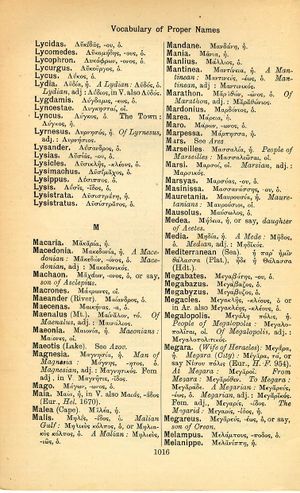Lycophron
νεκρὸν ἐάν ποτ' ἴδηις καὶ μνήματα κωφὰ παράγηις κοινὸν ἔσοπτρον ὁρᾶις· ὁ θανὼν οὕτως προσεδόκα → whenever you see a body dead, or pass by silent tombs, you look into the mirror of all men's destiny: the dead man expected nothing else | if you ever see a corpse or walk by quiet graves, that's when you look into the mirror we all share: the dead expected this
English > Greek (Woodhouse)
Λυκόφρων, -ονος, ὁ.
Latin > English (Lewis & Short)
Lycŏphron: ŏnis, m., = Λυκόφρων,
I Lycophron of Chalcis, in Eubœa, the author of Cassandra, an Alexandrine grammarian and tragedian of the time of Ptolemy Philadelphus: utque cothurnatum periisse Lycophrona narrant, Ov. Ib. 531: latebrae Lycophronis atri, so called from his obscure style, Stat. S. 5, 3, 157.
Latin > French (Gaffiot 2016)
Lўcŏphrōn, ŏnis, m. (Λυκόφρων), poète tragique de Chalcis, célèbre par l’obscurité de son style : Stat. S. 5, 3, 157 ; Ov. Ib. 531.
Latin > German (Georges)
Lycophrōn, phronis, Akk. phrona, m. (Λυκόφρων), ein griechischer Tragödiendichter aus Chalcis auf Euböa, Ov. Ib. 531: latebrae Lycophronis atri, wegen seiner dunklen Schreibart, Stat. silv. 5, 3, 157.

